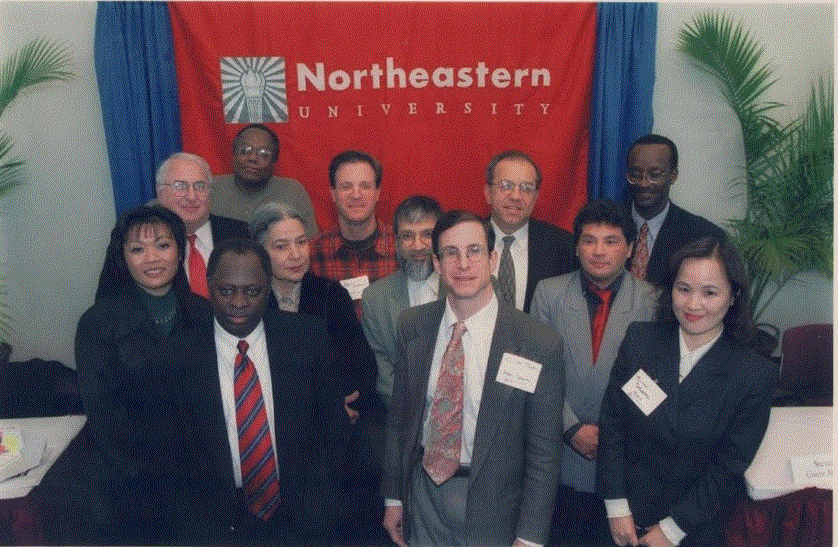THIRD WORLD VIEWS OF THE HOLOCAUST: SYMPOSIUM OVERVIEW
Northeastern University Symposium
Boston, April 18-20, 2001
The long-term impact of the Holocaust is not confined to Western society. Half a century since the end of the Shoah, intellectuals, writers and scholars from Africa, Asia and Latin America have also come to ponder the significance of Europe’s quintessential evil for their own societies and worldviews.
Northeastern University is both honored and humbled to host the first international symposium on the Shoah to privilege voices from the Third World.
In an age in which genocide persists alongside globalization, it is necessary to acknowledge that the Holocaust does not “belong” to the West alone.

Back Row (left to right): Steven Katz, Locksley Edmondson, Ilan Stavans, Nadim Rouhana, Gerald Gahima
Middle Row: Chivy Sok, Anita Desai, Shawkat Toorawa, Roberto Cabrera
Front Row: Edward Kissi, William Miles, Kinue Tokudome
Organizers of the Symposium are:
William Miles, Stotsky Professor of Jewish Historical and Cultural Studies, and The Brudnick Center on Violence and Conflict
With additional support from:
Office of the Dean of Arts and Sciences
The Department of Political Science
Symposium Concept
As instances of “ethnic cleansing” continue to stain humanity even at the advent of the millennium, the Nazi Holocaust of European Jewry still stands out as the touchstone of twentieth century genocide.
Scholarly debate on the uniqueness of the “Shoah” notwithstanding, it is difficult to assess, examine, or reflect upon modern mass extermination of civilian populations without reference to Hitler’s “Final Solution” of the Jews. Indeed, scholarly treatments of all other twentieth century genocides (from Armenia to Cambodia to Rwanda) invariably invoke the Nazi model of mass murder as the counterpoint for discussing these other cases.
Understandably, the outpouring of scholarship on the Nazi Holocaust in recent years reflects a primarily Eurocentric, or at least Western, perspective on this tragedy. Holocaust scholarship has been most pronounced in the academies of Western Europe, North America, and Israel. The Shoah is ineluctibly cast as a peculiarly European (if not German) phenomenon whose major immediate impact has been in the West and, indirectly, in the Middle East. As a result, traditional Holocaust scholarship has tended to underestimate the extent to which worldviews in non-Western societies have also been affected by the Shoah.
The symposium addressed this gap in understanding the long-range, inter-regional impact of the Holocaust because the Shoah does not “belong” merely to the West. Regrettably, genocide has recurred in other parts of the world, the holocaustal experience failing to impart whatever cautionary lesson the post-War world had hoped it would. Genocide, in its relentless universality, demands that all peoples bear witness. Third World views of the Holocaust are interlinked with Western concern for contemporary genocide in the South. They also represent a globalization of Holocaust consciousness, an inevitable consequence of so-called Americanization of the Holocaust.
Specifically, the symposium brought together non-Western scholars, writers and intellectuals whose work on their own societies has already acknowledged the Holocaust, as well as some “traditional” Holocaust scholars who have not necessarily focussed on the impact of the Holocaust upon Third World intelligentsia. Specifically, the symposium illuminated how the Shoah has influenced writers and scholars from Asia, Africa, and Latin America/Caribbean. Whereas other scholars and scholarly fora have approached genocide from a generally comparative perspective, this symposium uniquely addressed how the Holocaust paradigm per se has been integrated into non-Western worldviews.
It thereby advanced an interdisciplinary and transregional awareness of this cataclysmically formative event. “Third World Views of the Holocaust” serves as a scholarly mirror, enabling the West to better perceive its darkest historical side through the eyes of an also genocidally wounded South.
Sponsors
The Stotsky Professorship of Jewish Historical and Cultural Studies
Center for Interdisciplinary Studies, College of Arts and Sciences
Brudnick Center on Violence and Conflict
Department of Political Science
Department of African-American Studies
Spiritual Life Office
Holocaust Awareness Committee
International Scholars’ Forum
Jewish Studies Program
A Generous Alumnus